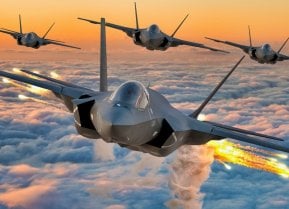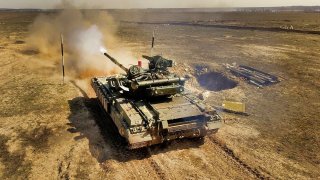Yes, Ukraine Can Still Beat Russia
If we look at all factors - not just military matters - Ukraine does have a chance to come out on top against Russia in this horrible war.
A recently published article by three prominent military experts on the tasks before Ukraine in its war with Russia is required reading.
As one would expect from Michael Kofman, Rob Lee, and Dara Massicot, the piece is smart, well-informed, balanced, and sobering, as well as helpful and hopeful.
As the title—“Hold, Build, and Strike: A Vision for Rebuilding Ukraine’s Advantage in 2024”—suggests, a Ukrainian victory is perfectly possible.
Ukraine’s supporters should be buoyed by the analysis. Russia’s should be depressed. One can only hope that the analysis will be read in Kyiv, especially by the currently feuding duo, President Volodymyr Zelensky and General Valery Zaluzhny, but not in Moscow.
And yet, through no fault of the authors, the piece is somewhat misleading, inasmuch as it focuses on things military—in particular, the number and quality of soldiers and armaments—while ignoring everything else and, by implicitly invoking (as all scholars always do) the ceteris paribus clause and holding “other things equal.”
Those other things include a slew of non-consequential domestic and international factors that can easily affect the course and outcome of the ongoing war, regardless of whether the numbers are right or wrong.
Think Past Military Matters
Other things are never equal, although we make that assumption to focus on the critical factors of interest to us.
Such other things include the morale, the economy, the regime, the leader, the population, the ideology, the culture, the international setting, and any number of unpredictable “black swans,” triggers, sparks, disasters, sudden deaths, and so on. Just consider some recent developments of obvious relevance to Russia’s ability to wage the war.
The recent mass protests in Bashkortostan showed that large-scale demonstrations are possible despite the coercive apparatus’s assiduous efforts to prevent them.
Thousands of Russians are lining up to support Boris Nadezhdin’s run for president, and, regardless of whether he is or is not a Kremlin stooge, they believe he’s for real. Many economists believe the sanctions will be especially painful this year, and that, although the Russian economy may be growing, that is due to massive investments in military sectors that are impoverishing broad swathes of the population. Russians appear to want three incompatible things: that the war be over, that Vladimir Putin remain in power, and that they be left alone. Russia’s dictator looks like he’s in control, but, as the Prigozhin coup attempt showed, the reality may be very different.
Reasons to Be Hopeful
Although Kofman et al. paint a generally optimistic picture for Ukraine, things may be far more hopeful than they suggest. Two recent performances, one by Putin and one by his acolyte, the head of Russia Today, Margarita Simonyan, illustrate the point.
On January 26, Putin visited the St. Petersburg State Marine Technical University and met with students who fought in the war against Ukraine. Read the text of Putin’s opening address and responses to questions, and everything seems fine. Watch his live performance, and everything looks different. He searches for words, he makes inexplicable pauses, he hems and haws, he looks distracted or confused, he rambles on and on, he seems not to know what he is talking about.
Some Russian analysts have suggested that the real Putin is dead and that his place has been taken by an ignorant double. Regardless of Putin’s existential condition, his January 26th performance revealed a man who is at best a shadow of his former self—the self-confident macho who brandished knives, posed bare-chested, hunted tigers, and intimidated audiences with the breadth of his knowledge and his ability to speak coherently and authoritatively for hours.
This Putin is weak, and it's impossible for his henchmen and members of political, military, and economic elites not to have noticed it. This Putin may or may not be fatally ill, but he’s clearly incapable of demanding respect, eliciting fear, and enjoying legitimacy. Is he equally incapable of fighting a war and leading a state, especially if his psychological condition worsens with age?
Simonyan is one of Putin’s greatest fans, and it’s no exaggeration to say that she is his Joseph Goebbels. Which means that what she says isn’t just her own opinion. It’s reflective at least to some degree of the thinking in Putin’s inner circles.
Reasons to Worry
In late January, she openly endorsed the destruction of the Ukrainian nation—or, not to mince words, genocide. “We don’t need a scorched earth” in Ukraine, she told her interlocutors on her talk show. Instead, “we need to save our people. Those whose brains have been washed and whose souls have been filled with decades of filth by Kiev, those souls we will cleanse, and whoever doesn’t want to be cleansed are filthy, and a filthy creature who doesn’t want to be washed will face an unenviable fate. Well, we have to differentiate between filthy creatures and those who are willing to be cleansed.”
Possibly suspecting that she’s treading on very thin ethical ice, Simonyan adds that “wiping all the mothers and baby carriages and everyone else from the face of the earth would be Nazism.” Unless, of course, they happen to be filthy creatures who refuse to be washed.
So, Simonyan offers Ukrainians a choice: become Russian, profess their love of Russia, and repent, or face an unenviable fate. Death, perhaps? A one-way ticket to the Gulag? Simonyan doesn’t say, but the implications are clear. Hers is a Final Solution to the damned Ukrainian Question that’s been giving Russian imperialists and racists sleepless nights for centuries. And like her tsarist and Soviet predecessors, she opts for the tried and true methods of intentional mass violence, death, and destruction. Or, in a word, genocide.
Why does Simonyan matter to the outcome of the war? Her sentiments are those of the Kremlin. More important, Ukrainians know it, having read her statements and those of other influential Russians. Some Ukrainians will choose self-immolation, but most will see, yet again, that the war against Russia is existential. If Russia wins, Ukraine will disappear and Ukrainians will be killed—not some of them, but, as Simonyan states, all of them.
Ukrainians, therefore, have no choice but to fight. Simonyan and other genocide enablers of her ilk are effectively stealing Ukrainian resolve and enhancing Ukrainian morale.
It also increases the likelihood of a severe Russian defeat, possibly even in the absence of the reforms recommended by Kofman et al.
About the Author
Dr. Alexander Motyl is a professor of political science at Rutgers-Newark. A specialist on Ukraine, Russia, and the USSR, and on nationalism, revolutions, empires, and theory, he is the author of 10 books of nonfiction, including Pidsumky imperii (2009); Puti imperii (2004); Imperial Ends: The Decay, Collapse, and Revival of Empires (2001); Revolutions, Nations, Empires: Conceptual Limits and Theoretical Possibilities (1999); Dilemmas of Independence: Ukraine after Totalitarianism (1993); and The Turn to the Right: The Ideological Origins and Development of Ukrainian Nationalism, 1919–1929 (1980); the editor of 15 volumes, including The Encyclopedia of Nationalism (2000) and The Holodomor Reader (2012); and a contributor of dozens of articles to academic and policy journals, newspaper op-ed pages, and magazines. He also has a weekly blog, “Ukraine’s Orange Blues.”


